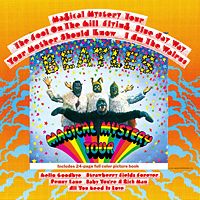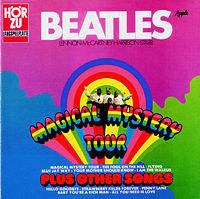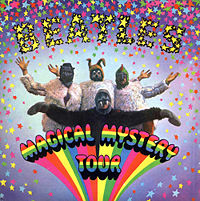Difference between revisions of "Magical Mystery Tour (album)"
From Beatles Wiki - Interviews, Music, Beatles Quotes
(New page: {{Infobox album | Name = Magical Mystery Tour | Type = studio | Artist = The Beatles | Cover = Magical_Mystery_Tour.jpg | Released = 27 November 1967 (US) |...) |
|||
| Line 24: | Line 24: | ||
}} | }} | ||
{{Magical Mystery Tour tracks}} | {{Magical Mystery Tour tracks}} | ||
| + | |||
| + | {{Extra album cover 2 | ||
| + | | Upper caption = Alternate cover | ||
| + | | Type = studio | ||
| + | | Cover = MMT-German-Stereo_front.jpg | ||
| + | | Lower caption = 1971 German MMT LP with every track in true stereo | ||
| + | }} | ||
}} | }} | ||
| + | {{Infobox album | ||
| + | | Name = Magical Mystery Tour | ||
| + | | Type = ep | ||
| + | | Longtype = ([[Double album|Double]] [[Extended play|EP]]) | ||
| + | | Artist = [[The Beatles]] | ||
| + | | Cover = MagicalMysteryTourDoubleEPcover.jpg | ||
| + | | Released = 8 December 1967 (UK) | ||
| + | | Recorded = 25 April – 7 November 1967, Abbey Road Studios and [[Olympic Studios]], London | ||
| + | | Length = 19:08 | ||
| + | | Label = [[Parlophone]] | ||
| + | | Producer = [[George Martin]] | ||
| + | | Reviews = | ||
| + | }} | ||
{{cquote|''Sgt Pepper's Lonely Hearts Club Band'' was a musical fragmentation grenade, exploding with a force that is still being felt. It grabbed the world of pop music by the scruff of the neck, shook it hard, and left it to wander off, dizzy but wagging its tail. As well as changing the way pop music was viewed, it changed the entire nature of the recording game — for keeps. Nothing even remotely like ''Pepper'' had been heard before. It came at a time when people were thirsty for something new, but still its newness caught them by surprise. It certainly caught me on the hop! [...] With ''Sgt. Pepper'' The Beatles held up a mirror to the world. And in this looking glass the world saw a brilliant reflection of its kaleidoscopic 1967 self. It saw not the shambolic and often absurd cavortings of the hippie movement, but its perfect image — an elegant ideal; not the sordid gutterland of drug addiction, but the intriguing possibility of creative substance abuse.|quotewidth=500px|George Martin|2006}} | {{cquote|''Sgt Pepper's Lonely Hearts Club Band'' was a musical fragmentation grenade, exploding with a force that is still being felt. It grabbed the world of pop music by the scruff of the neck, shook it hard, and left it to wander off, dizzy but wagging its tail. As well as changing the way pop music was viewed, it changed the entire nature of the recording game — for keeps. Nothing even remotely like ''Pepper'' had been heard before. It came at a time when people were thirsty for something new, but still its newness caught them by surprise. It certainly caught me on the hop! [...] With ''Sgt. Pepper'' The Beatles held up a mirror to the world. And in this looking glass the world saw a brilliant reflection of its kaleidoscopic 1967 self. It saw not the shambolic and often absurd cavortings of the hippie movement, but its perfect image — an elegant ideal; not the sordid gutterland of drug addiction, but the intriguing possibility of creative substance abuse.|quotewidth=500px|George Martin|2006}} | ||
Revision as of 17:03, 1 January 2010
| Magical Mystery Tour | ||||
 |
||||
| Studio album by The Beatles | ||||
|---|---|---|---|---|
| Released | 27 November 1967 (US) | |||
| Recorded | 24 November 1966 – 7 November 1967, Abbey Road Studios and Olympic Studios, London | |||
| Genre | Rock, psychedelic rock | |||
| Length | 36:49 | |||
| Label | Capitol | |||
| Producer | George Martin | |||
| The Beatles chronology | ||||
|
||||
| Singles from Magical Mystery Tour | ||||
|
||||
|
||||
| Alternate cover | ||||

1971 German MMT LP with every track in true stereo
|
||||
| Magical Mystery Tour | |
 |
|
| EP (Double EP) by The Beatles | |
|---|---|
| Released | 8 December 1967 (UK) |
| Recorded | 25 April – 7 November 1967, Abbey Road Studios and Olympic Studios, London |
| Length | 19:08 |
| Label | Parlophone |
| Producer | George Martin |
| “ | Sgt Pepper's Lonely Hearts Club Band was a musical fragmentation grenade, exploding with a force that is still being felt. It grabbed the world of pop music by the scruff of the neck, shook it hard, and left it to wander off, dizzy but wagging its tail. As well as changing the way pop music was viewed, it changed the entire nature of the recording game — for keeps. Nothing even remotely like Pepper had been heard before. It came at a time when people were thirsty for something new, but still its newness caught them by surprise. It certainly caught me on the hop! [...] With Sgt. Pepper The Beatles held up a mirror to the world. And in this looking glass the world saw a brilliant reflection of its kaleidoscopic 1967 self. It saw not the shambolic and often absurd cavortings of the hippie movement, but its perfect image — an elegant ideal; not the sordid gutterland of drug addiction, but the intriguing possibility of creative substance abuse. | „ |
|
—George Martin, 2006 |
||
| “ | Sgt Pepper's Lonely Hearts Club Band is one of the most important steps in this group's career. It had to be just right. We tried and I think succeeded in achieving what we set out to do. If we hadn't, then it wouldn't be out now. | „ |
|
—John Lennon, 1967 |
||
| “ | You just have to keep striving for perfection. This LP, I think, is the best we've done, but only the best we could do at that time. The next one ought to be better. That's always got to be the goal. We were born as musicians. That's our gig in life. Whatever your gig is in life, you have to keep trying to improve, and you should improve if you're just soaking up life, and everything that's going on. | „ |
|
—George Harrison, 1967 |
||
| “ | 'Sgt. Pepper' is Paul after a trip to America and the whole West Coast long-named group thing was coming in. You know, when people were no longer the Beatles or the Crickets-- they were suddenly Fred And His Incredible Shrinking Grateful Airplanes, right? So I think he got influenced by that and came up with this idea for the Beatles. | „ |
|
—John Lennon, 1980 |
||
| “ | It was an idea I had, I think, when I was flying from L.A. to somewhere. I thought it would be nice to lose our identities, to submerge ourselves in the persona of a fake group. We would make up all the culture around it and collect all our heroes in one place. So I thought, A typical stupid-sounding name for a Dr. Hook's Medicine Show and Traveling Circus kind of thing would be 'Sgt. Pepper's Lonely Hearts Club Band.' Just a word game, really." | „ |
|
—Paul McCartney, 1984 |
||
| “ | We were fed up with being Beatles. We really hated that fucking four little mop-top boys approach. We were not boys, we were men. It was all gone, all that boy shit, all that screaming, we didn't want anymore, plus, we'd now got turned on to pot and thought of ourselves as artists rather than just performers... then suddenly on the plane I got this idea. I thought, 'Let's not be ourselves. Let's develop alter egos so we're not having to project an image which we know. It would be much more free.' | „ |
|
—Paul McCartney, 1994 |
||
| “ | Sgt Pepper, for me, wasn't our best album. That was the peak for everyone else and, for The Beatles, that was where they were really at their best. But, for me, it was a bit like being a session musician because we were trying to get a concept thing. Sgt Pepper was like a show; it wasn't just an album. It was like a stage show. [...] We were gonna do it like in a theatre. We'd do it in the studio and simulate it, but we didn't in the end. We did it for the first couple of tracks and then it faded into an album. [...] It was as if we did a few tracks and suddenly there was a fire and everybody ran out of the building, but we carried on playing. We played the greates, but everyone missed it! | „ |
|
—Ringo Starr, 1967 |
||
| “ | All we're trying to do is something different, you know. We spent a bit more time of the LP, just to try and generally make it better. When we make a record, we might be genuinely knocked out by it, but then, when we listen to it a few times, we realise that it's not as good as we think it is. That's what happened with Revolver. When we first did it we were really knocked out by most of the tracks, but by the time the record was issued we were a bit fed up with it and looking towards the new one. | „ |
|
—George Harrison, 1967 |
||